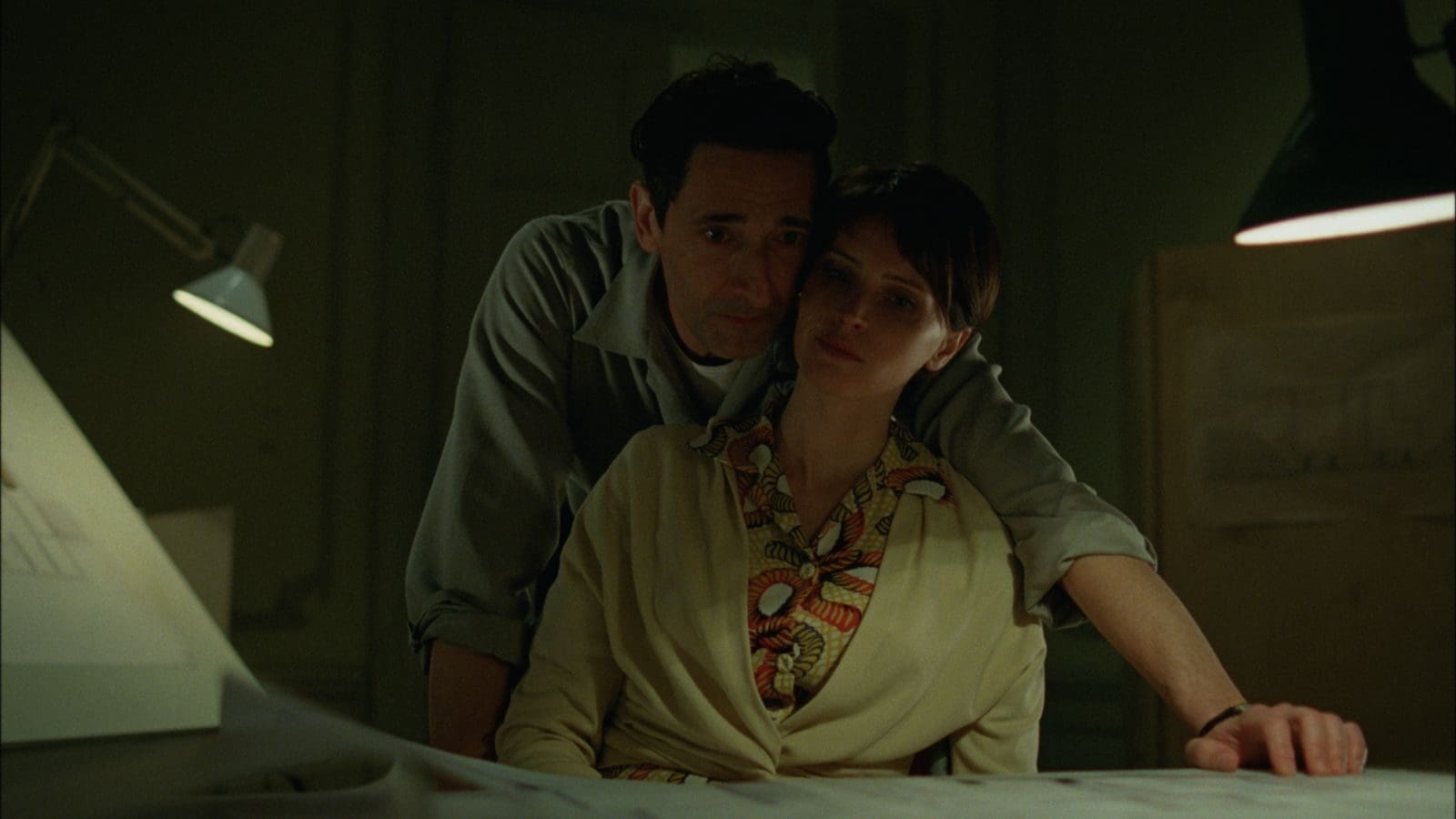
It’s rare to see a film take the leap from nearly unknown to THE topic of conversation when it comes to the Oscars like Brady Corbet’s The Brutalist has these last couple of weeks. Yet here we are, and frankly, it’s well-deserved because Corbet’s vision for a simplistic immigrant story is bold and incredibly crafted.
Corbet instantly draws viewers into this story of Hungarian-Jewish immigrant Laszlo (Adrien Brody) coming to a post-WWII America by focusing on a necessary perspective. At first, the film comes across aimless because of its lack of distinct narrative direction and pacing—which doesn’t aid the film’s lofty three-and-a-half hour runtime. But, its meandering connects viewers to Laszlo’s own lostness. Honestly, there’s a palpable sink in Laszlo’s demeanor as he discovers that he’s nearly as undesired as he was during the Holocaust, and finds his culture forcibly watered down. Even worse, he starts at zero in America—despite having a strong background as an architect—and is often viewed as lesser. It’s a sad reality that’s just as relevant as ever for those immigrating to America and it ultimately causes a dangerous vulnerability to form in Laszlo.
Eventually, after some personal hardships, Laszlo falls under the wings of wealthy industrialist Harrison Lee Van Buren (Guy Pearce), who tasks him with an ambitious architectural feat. While Harrison presents Laszlo with a genuine opportunity in America he can’t find elsewhere, it comes at harsh costs. Harrison constantly shows Laszlo off to rich friends as a personal achievement or trophy, and cares for Laszlo simply for his own gain. Harrison’s gestures aren’t outwardly malicious and often appear like an act of friendship, but it’s all wrapped with selfish intentions that are hard to shake. Still, though, Harrison has an irresistible charm that manages to keep Laszlo around and, oddly enough, results solid humor throughout the film. Seriously, it’s surprising how funny The Brutalist can be and it’s largely because of how Corbet uses Harrison’s arrogance and the framing of certain interactions to create light-hearted laughs.
Yet, Harrison’s real impact on Laszlo leads to gut-wrenching realizations and arcs that consume the second half of The Brutalist. As Laszlo becomes more deeply wrapped around Harrison’s finger and enveloped into this seemingly never-ending project, you feel his soul slowly wear away. Laszlo’s most damaging vices (including drug use and divides within his family dynamic) escalate and even get used against him by Harrison. Even when Laszlo finally finds his own footing, he can’t help but be drawn back to Harrison’s vision and the devastation of it is remarkable. You also start to see Harrison’s “caring” persona deteriorate and his cruel inner self comes out in horrifying ways that cause legitimate trauma to Laszlo. Throughout all of this too are performances that simply captivate at every turn.
Brody delivers an Oscar-worthy performance that reflects Laszlo’s shifting inner emotions throughout this endeavor. He expertly bears Laszlo’s heart and pride in an unflinching manner for all to see, resulting in some of Brody’s most impactful work in a long time. Pearce is also great as Harrison, acting as this villain below the surface who leaves viewers hollow once he’s done treating Laszlo with kid gloves. When Harrison’s true colors come out, Pearce holds nothing back and it’s what gives the dynamic between Harrison and Laszlo a lasting impact. Themes tied to American greed and wealth going hand in hand with social power are exemplified in these performances and make The Brutalist land perfectly for the modern American immigrant perspective. Also, it’s worth noting that Felicity Jones puts in a stunning performance—despite only being in the second half of the film—and delivers a monologue that will elicit applause for the meaning and rawness of her power.
Best of all, Corbet magnifies the captivating nature of these thematic threads, perspectives, and storytelling through the sheer technical ambition he displays. Right in the opening moments, Corbet establishes a stunning sense of scale that elevates every emotion of the experience. Daniel Blumberg’s score is flawless and award-worthy for its ability to immerse viewers in the energy it effortlessly builds. Some of cinematographer Lol Crawley’s shots are absolutely jaw-dropping because of the wild scope of these architectural projects and the sense of Laszlo smallness in comparison to them. There’s such a grand feeling to this narrative that’s so well-captured visually, and it always heightens the power of everything Corbet evokes with Laszlo’s arc. With this marrying of epic scope and deeply threaded storytelling, The Brutalist matches the energy and importance of a Citizen Kane or a There Will Be Blood when it comes to effectively evoking corrupt American ideals and detailing how they cultivate tortured souls and legacies.
The hype for The Brutalist is warranted in every way thanks to the great performances and storytelling that are driven by Corbet’s standout vision. It’s absolutely an awards frontrunner that may not fit for every audience, but will definitely stand the test of time as a stunning showcase of talent.

